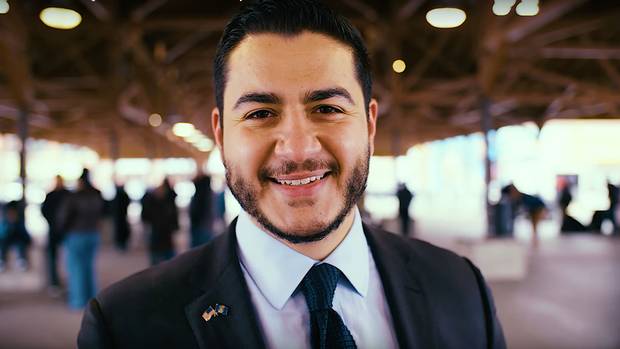Abdul El-Sayed played football at his suburban Detroit high school. He was pretty good, so he was always double-teamed.
In his first game after the 9/11 attacks, opposing players hurled insults at him. "Go home." "Raghead." That sort of thing. In the blink of an eye, he recalled, "I went from being a chubby kid with a funny name to being a very stigmatized minority."
Naturally, he was angry. He took a swing at one of the taunters. "The coach pulled me out of the game and said, 'Listen, you're going to be Abdul El-Sayed for the rest of your life, and that's going to mean something to other people. You can use that as an excuse or you can use it as motivation. You get to pick that.'"
It became obvious some time ago which path he chose. Dr. El-Sayed excelled at high school, becoming captain of the football, lacrosse and wrestling teams. He won a Rhodes Scholarship. He earned a doctorate in public health from Oxford University and a medical degree from Columbia. At 30, he became the health director of Detroit.
Now he has set his sights on an even bigger job. Still only 32, he is running for governor of Michigan. If elected, the son of Egyptian immigrants would be the country's first Muslim governor. He would also be the youngest governor since a 32-year-old Bill Clinton was elected in Arkansas in 1978.
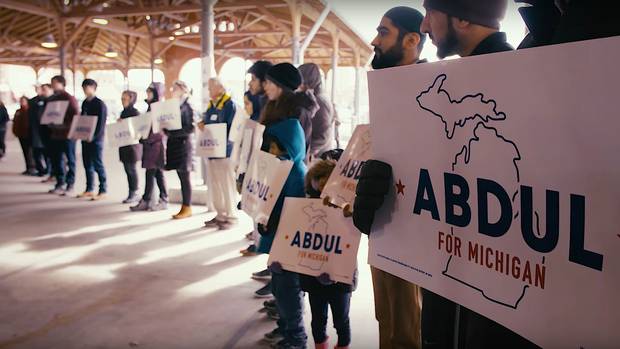
Now, Dr. El-Sayed faces another challenge: running against established Democratic rivals for the nomination for governor of Michigan.
ABDUL FOR MICHIGAN CAMPAIGN/YOUTUBE
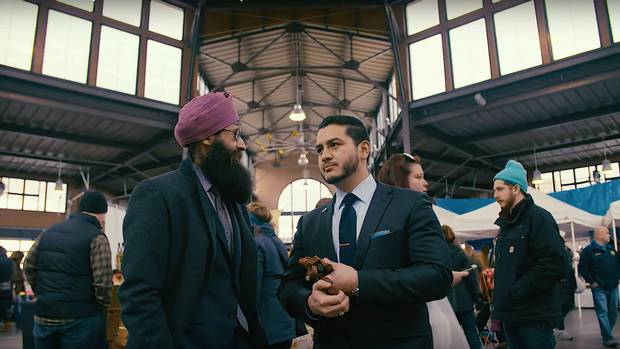
Dr. El-Sayed has just completed a statewide tour that took him to 53 cities and 26 counties.
ABDUL FOR MICHIGAN CAMPAIGN/YOUTUBE
He declared his candidacy on Feb. 25, telling backers that "the politics of fear and hatred threaten to divide us." Since then he has been criss-crossing the state to seek support for the Democratic gubernatorial nomination.
It isn't the most promising time for a man named El-Sayed to be running for office. Hate crimes against Muslims are up. One recent report said the number of hate groups targeting Muslims tripled in 2016, the year Donald Trump won the presidency.
The Trump administration's attempts to ban immigration from seven mainly Muslim countries to "protect the nation from foreign terrorist entry into the United States" have left many Muslim Americans feeling ostracized, just as they did after 9/11. Over all, American feelings toward Muslims are warmer than they were a few years ago, polling by the Pew Research Center found, but Americans still view Islam less favourably than the other major religions.
In the Detroit area, tensions had been simmering long before the proposed ban. Angry words broke out in the northern suburb of Sterling Heights when some residents objected to a plan for a big mosque there.
Fatima Salman, 39, a community organizer and long-time friend of Dr. El-Sayed, says some people don't just whisper their hostility. Not long ago, she was dropping off her four-year-old at daycare when a man in another car saw her head scarf. He started honking his horn, made shooting motions with his hand and tried to run her off the road.
"The negative, ugly rhetoric this administration has been putting out, I can definitely see it trickling down," Ms. Salman said. "The Trump climate and all the fear make us worry about what the country is all about. Abdul's candidacy reminds us what the country was built on."
It is a theme Dr. El-Sayed never fails to repeat as he travels around Michigan. At a meeting of local Democrats at a public library in Plymouth, half an hour from downtown Detroit, he gave his own life story as an example of the United States at its best. He was raised, he said, "in this unlikely American family – probably the most unlikely American family you ever heard of."
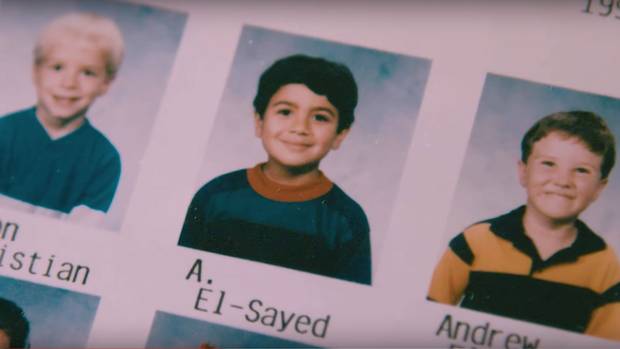
Dr. El-Sayed credits being raised by ‘the most unlikely American family you ever heard of’ for his drive toward public service.
ABDUL FOR MICHIGAN CAMPAIGN/YOUTUBE
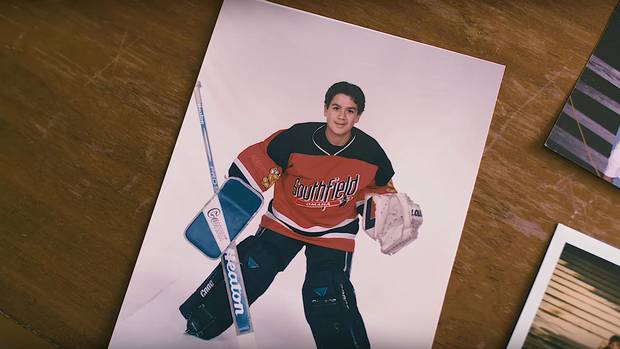
Dr. El-Sayed was captain of his high school’s football, lacrosse and wrestling teams.
ABDUL FOR MICHIGAN CAMPAIGN/YOUTUBE
His father grew up in Alexandria, Egypt, the son of a vegetable vendor and an illiterate homemaker. He was the youngest of six children. They lived in a one-bedroom apartment, where he would do his homework by the light of the streetlamps outside. Rising to the top of his highschool class, he got a visa to study engineering in Michigan.
He and his wife divorced shortly after Dr. El-Sayed was born. He married a Michigan woman, a professor of engineering, and Dr. El-Sayed grew up in their house. Thanksgiving dinners would feature debates among his father, the engineer and part-time imam; his grandmother on his stepmother's side, a Presbyterian deacon and nurse; and an uncle, an atheist who came to the United States from Communist Poland. Mohamed, Judy and Piotr would talk about everything from God to country to the meaning of democracy. They didn't always agree, Dr. El-Sayed said, but if they could come together every year around the Thanksgiving table, "I know that we can come together as a country."
With a strong family and a good education in public schools, Dr. El-Sayed rose quickly. In 2015, Detroit Mayor Mike Duggan appointed him to rebuild the health department, which had been privatized amid the city's financial collapse. He arrived to find just five employees, working in the back of the city parking department. As he walked through the parking lot to work on his first day, a man asked him, "Son, do you work here?" No, he said, I'm the health director of Detroit.
Detroit's health statistics are dire. Its infant mortality rate is worse than Mexico's. Dr. El-Sayed set up a SisterFriends program that matched expectant mothers with women who would guide them through their pregnancy. Another program provided free eyeglasses to needy schoolchildren.
When politics beckoned, he went to see the mayor. Mr. Duggan told him: If you run and you win, you will make history. Even if you lose, you will make a point. A few days later, Dr. El-Sayed gave his notice.
Though the election for governor is still a year and a half away, he has been campaigning hard ever since, spending hours on the road bouncing from university campus to candidates meeting to media interviews. As he put it, "I don't go less than 100 miles per hour." He has just completed a statewide tour, Listening For Our Future, that took him to 53 cities and 26 counties.
He is bound to face more established rivals for the Democratic nomination. Gretchen Whitmer, a former state Senate minority leader, has already joined the race. U.S. Congressman Dan Kildee said on Tuesday that he would not run, leaving Ms. Whitmer and Mr. El-Sayed the most prominent candidates so far. It's not clear yet which Republican the Democratic nominee would meet in the general election. The current governor, former business executive Rick Snyder, is serving his second term and is not allowed to run again, so the Republicans will have their own nomination race.
Whether an observant Muslim who wears a beard and prays regularly can win election in a state that just voted – narrowly – for Mr. Trump is an open question. Dr. El-Sayed's wife, Sarah Jukaku, a mental-health doctor whose family is from India, wears a head scarf.
On the other hand, Dr. El-Sayed said, his would not be the first breakthrough of its kind. "I know I look a bit different, but I have seen a successful politician who looked a bit different."
The reference to Barack Obama was deliberate, and Dr. El-Sayed has something of the same cool factor. In his narrow pants and checked shirts, he is as much at home in a hip Detroit coffee bar as he is in the Plymouth library.
Though he is a rookie politician, he knows how to work a room. He had the mainly white, mainly older crowd in Plymouth eating out of his hand with tried-and-true Democratic phrases such as "People before profits" and "No government by spreadsheet," quips about his "unfortunately named brother Osama" and appeals to American ideals such as freedom of religion and freedom of speech.
After a bitter election such as last year's, his call for healing, dialogue and a country in which everyone, regardless of origin, is considered equally American has obvious attraction.
He stressed that even if his election would make history, he is not running just to be the first Muslim governor. He is running to be the governor of Michigan. In any case, he said, people shouldn't be worrying about how others pray or who they pray to but what they are praying for, "and I can tell you I pray for us and I pray for my state and I pray for my country."
Dr. El-Sayed said he has faced his share of prejudice along the road to success. "I know what it's like to have your butt kicked by a cop for being the wrong colour in the wrong place at the wrong time." Even after he became a doctor, some patients refused to be treated by him after they saw what he looked like or heard his name. His response today is the same one he learned from his football coach: Don't lash out. Just keep doing the things they think you can't do.
"I'm the kind of person who has learned that the way that you oppose this is being better every day, by keeping a smile on your face and going out and doing the things that need to be done in society," he said. It's that sunny message that he hopes will take him to victory in a time of darkness and division.
Marcus Gee is a columnist for The Globe and Mail.
MARCUS GEE IN MICHIGAN: MORE FROM THE GLOBE
